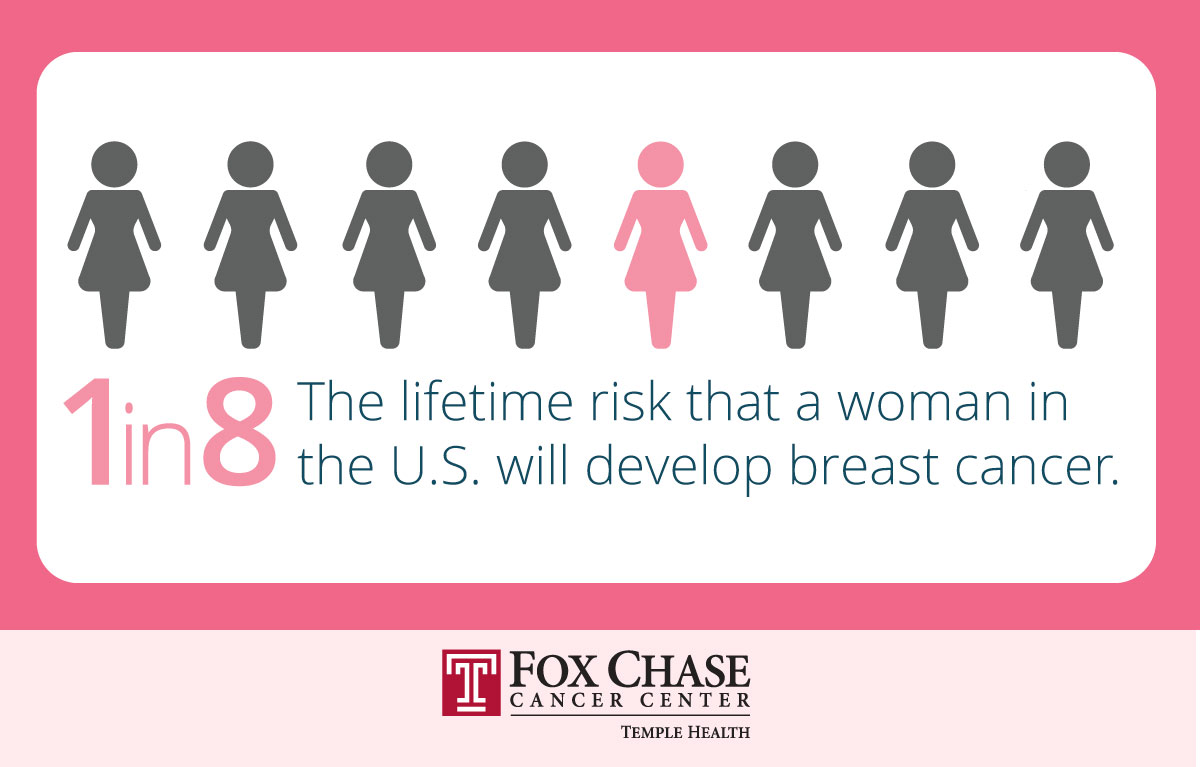
PHILADELPHIA (October 1, 2018) – October is Breast Cancer Awareness month. Fox Chase Cancer Center reminds women to schedule their screening test for breast cancer—the most reliable way to detect breast cancer early, when the disease is most treatable.
According to the American Cancer Society (ACS), breast cancer is the most common cancer in American women, except for skin cancers. The average risk of a woman in the U.S. developing breast cancer sometime in her life is about 12 percent, or a 1 in 8 chance. The chance that a woman will die from breast cancer is about 1 in 38 (about 2.6 percent).
As of January 2018, there are more than 3.1 million breast cancer survivors in the U.S., including women still being treated and those who have finished treatment. “Today, there is greater awareness of the disease, and breast cancer is being detected earlier through screening,” said Kathryn Evers, MD, Senior Radiologist and Professor, Diagnostic Imaging, Fox Chase. “Overall, patients are experiencing better outcomes as a result of state-of-the-art treatment options and less extensive surgery.”
Signs and Symptoms
Knowing how your breasts normally look and feel is important for breast health and helps you to recognize any changes that may occur. Signs of breast cancer include:
- Lump in the breast or underarm (armpit)
- Swelling or thickening of all or part of the breast
- Dimpling or skin irritation of breast skin
- Localized, persistent breast pain
- Redness, scaliness or thickening of the nipple or breast skin
- Nipple discharge (other than breast milk)
- Any change in the size or shape of the breast
“Some women experience one or more symptoms, while others experience none. Let your doctor know if you experience any so he or she can determine the cause,” said Evers. “Regular screenings and mammograms are still the most reliable way to detect breast cancer in its early stages, even before symptoms appear.”
Risk Factors
The main risk factors for breast cancer include being a woman, getting older (most breast cancers are found in women ages 55 and older), and having changes in certain breast cancer genes (BRCA1 and BRCA2). Other uncontrollable factors that may increase risk include personal/family history, race, breast density and menstrual period history.
Certain risk factors are lifestyle-related, including the use of birth control pills, hormone therapy after menopause, having children, drinking alcohol, being overweight or obese, and physical activity. Even if a woman has one or several risk factors, this does not mean she’ll develop breast cancer. “Women need to familiarize themselves with all of the risk factors, and for those they can control, they need to make smart lifestyle decisions that can lower the risk,” said Evers.
Breast Cancer Screening
The American Cancer Society has screening guidelines for women at average risk of breast cancer, and for those at high risk for breast cancer.
- Women at high risk for breast cancer based on certain factors should get a mammogram and an MRI every year. Fox Chase also offers molecular breast imaging (MBI), which may be used as an alternative to MRI.
- For women at average risk:
- Women ages 40 to 44 have the option to start screening with a mammogram every year.
- Women ages 45 to 54 should get a mammogram every year.
- Women age 55 and older can switch to a mammogram every other year or choose to continue yearly mammograms. Screening should continue as long as a woman is in good health and is expected to live 10 more years or longer.
“Several tests may be used in detecting breast cancer, each with their own benefits and risks. Women should talk with their doctor to determine the best option for them,” said Evers.
- A mammogram is an x-ray exam of the breast used to detect and evaluate breast changes. Its detection ability depends on tumor size and breast tissue density. Three-dimensional (3D) mammography is a type of digital mammography in which x-ray machines are used to take pictures of thin slices of the breast from different angles and computer software is used to reconstruct an image.
- In addition to mammography, a woman’s doctor may prescribe one of the tests below:
- Breast ultrasound is often used along with mammography for high-risk women and women with dense breast tissue.
- A breast MRI (magnetic resonance imaging) may be used to screen high-risk women and gather more information about a suspicious area found on a mammogram or an ultrasound.
- Molecular breast imaging (MBI) is a new technology that may be used to screen for breast cancer in women with dense breast tissue or to investigate breast abnormalities when other screening tests have been inconclusive.
Fox Chase offers a Risk Assessment Program for individuals and families concerned about their risk for certain types of cancer. To learn more, visit FoxChase.org.